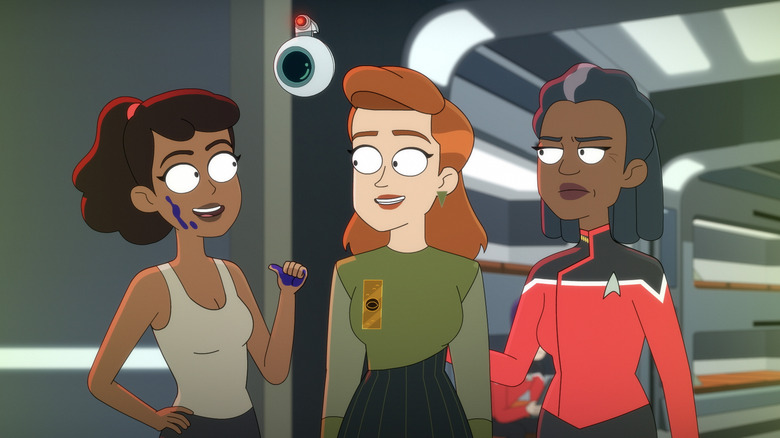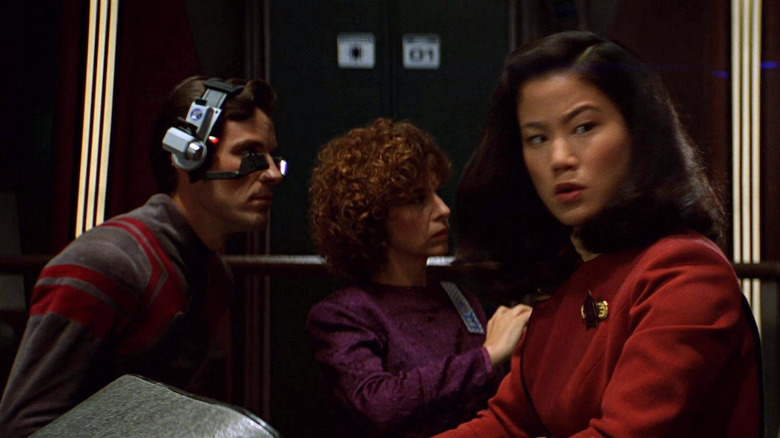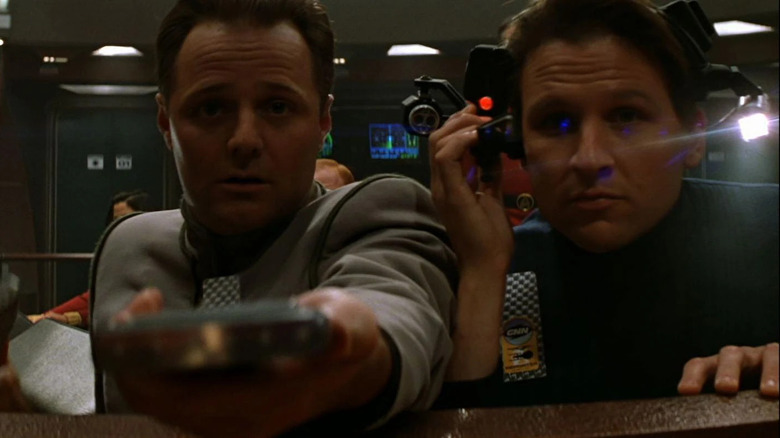Star Trek: Lower Decks Sheds New Light On Journalism In The Trek Universe
This post contains spoilers for the latest episode of "Star Trek: Lower Decks."
One of the plot elements in the latest episode of "Star Trek: Lower Decks," called "Trusted Sources," is that the U.S.S. Cerritos is going to be scrutinized by a visiting journalist named Victoria (Alison Becker). She is ready to interview crew members, and is always accompanied by a levitating camera. She is on the ship to write a story about a new initiative proposed by Captain Freeman that would direct Starfleet vessels to follow up on alien species that hadn't been heard from in years. The initiative is an excuse for "Lower Decks" to make sequels to any random episode of "Star Trek: The Next Generation" that they pleased under the storytelling auspices of standard operating procedure.
The episode they choose to revisit is "Symbiosis," an episode from NextGen's first season. That episode saw the U.S.S. Enterprise uncovering a conspiracy perpetrated by one world to keep another addicted to narcotics, all under the subterfuge that the drugs were medicine for a plague. When the "Lower Decks" journalist discovers that the previously addicted planet had essentially turned itself around and was now peaceful and happy some 17 years after the Enterprise visited, she is disappointed. There's no story here. A planet is merely living in harmony.
The dissemination of information has always been left a little unclear on "Star Trek." Because Trek shows take place on military vessels outside the civilian world, it's rare that characters are depicted sitting around watching the news on a viewscreen, or catching up on the events of the world on their PADDs. When characters do read, it's either classic literature or published reports from within their field of expertise. "Star Trek" is a world where study never ends.
Reporters of the future
There's something utopian about the relative lack of TV news in the future. Perhaps, because the galaxy is so big, it would be a churlish exercise to stay on top of the news of the day. As such, living in "Star Trek" would require a degree of compartmentalization. One will only be informed as far as it would enrich their minds. There will be no "junk" news in the future. Up until 1994, one might even be forgiven for assuming that news media has come to an end in Roddenberry's vision.
The earliest example of actual news reporters this author can recall in "Star Trek" was in David Carson's 1994 film "Star Trek: Generations." That film begins with a sequence on board the newly christened Enterprise-B. The ship doesn't have a full crew complement, and is only set to fly out to Pluto and back, but its launch is a celebrated occasion accompanied by Montgomery Scott (James Doohan), Admiral Kirk (William Shatner) and Commander Chekov (Walter Koenig). As Scotty, Kirk, and Chekov walk into the bridge, they are mobbed by paparazzi, each holding digital sound recorders of some kind, and several with lights and cameras mounted to their heads.
This scene had Trekkies wondering for the first time how information was shared among civilians in "Star Trek." It suddenly stood to reason that journalism would certainly not die by the 23rd century. It's simply that Starfleet officers don't read newspapers and magazines. Starfleet officers are nerds who read essays and listen to lectures. One might be curious to see what the rest of the world is reading. Is there celebrity gossip? Fashion industry news? Art rags? Food criticism? Obituaries? Comic strips?
Jake Sisko
In later seasons of "Star Trek: Deep Space Nine," Jake Sisko (Cirroc Lofton), not wanting to be a Starfleet officer, tries his hand at writing. He writes fiction, but also briefly endeavors to be a reporter. It seems that in the future, journalists do not work for a single outlet, but put together reports on spec, then disseminate their information to whatever publisher(s) handle(s) the news. If one watches enough "Star Trek," they may get the impression that the galaxy is big enough, and resources are so plentiful, that anyone will be permitted to follow their passions. Jake, in wanting to be a journalist, reveals that information still needs to be shared, no matter how modestly. And, unlike in "Star Wars," planets are constantly in close communication. Everyone seems to know everything in "Star Trek." In "Star Wars," a few years can pass and Luke Skywalker can be forgotten entirely. Were there no video recordings of him?
In the first season of "Star Trek: Picard," the title character (Patrick Stewart) is the victim of a badgering sit-down TV interview, the very first seen on "Star Trek." The first season of "Picard" reveals that the Federation had become a more closed-minded organization, having once refused to help evacuate the planet Romulus when it was in an extreme crisis. The "Picard" news media was meant to reflect the bitterness of the world as it now looked in 2399, mirroring aggressive real-life outlets like Fox News. Later in the episode, an admiral mentions that she watched Picard's interview "on the holo," implying that some people do watch the news with their breakfast.
"Lower Decks" has previously used a TV news broadcast as a means to communicate exposition. "Trusted Sources" depicts a journalist. The news is still alive. That's good news.


